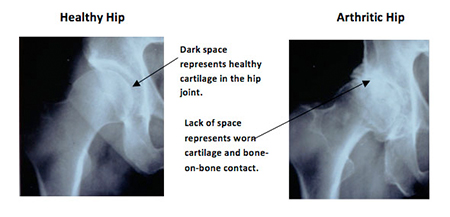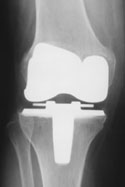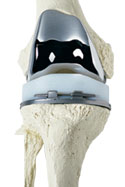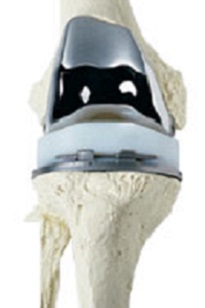Total Knee Replacement
Total knee replacement surgery, also called arthroplasty, is an option for many suffering with pain from dysplasia or osteoarthritis, a disease that involves the breakdown of cartilage in one or more joints. This causes bones in the affected area to grind against each other, causing severe pain and limited joint mobility.
The first total knee replacement surgery was performed more than 30 years ago, and since then, millions of people have received knee replacements. Total knee replacement involves removing the diseased bone and cartilage and resurfacing it with orthopedic implants re-creating the smooth gliding surfaces that were once intact.
During the surgery, the joint is exposed by an incision made down the center or off to the side of the knee. The damaged sections of bone are removed to make room for the replacement components. The replacement implants include a metal alloy on the end of the femur (thighbone) and polyethylene (plastic) on the tibia (shinbone) and patella (kneecap). The implants create a new, smoothly functioning joint that prevents painful bone-on-bone contact.

Benefits of Total Knee Replacement
- Eliminate or reduce pain
- Enhance movement and mobility
- Improve quality of life
- Return to normal activity
- Low-impact sports and activities
Total knee replacement is one option available to you and your surgeon. Only your orthopedic surgeon can determine if you are a candidate for this implant or if another type of implant would better suit your unique situation.
Total Knee Replacement Complications
While uncommon, complications can occur during and after surgery. Some complications include infection, blood clots, implant breakage, malalignment, and premature wear. Although implant surgery is extremely successful in most cases, some patients still experience stiffness and pain. No implant will last forever and factors such as the patient’s post-surgical activities and weight can affect longevity. Be sure to discuss these and other risks with your surgeon.
Preparing for Total Knee Replacement Surgery
Patients should begin preoperative strengthening exercises to help them prepare for surgery and their recovery. Patients may be given a comprehensive nutrition plan to help ensure optimum health before surgery. There are many things that your surgeon may do to minimize the potential for complications. Your surgeon may have you see a medical physician before surgery to obtain tests. You may also need to have your dental work up to date and may be shown how to prepare your home to avoid falls.
After Surgery

Total Knee Replacement

After Total Knee Replacement Surgery
After surgery, you probably will be hospitalized for 5 to 7 days. During this time, you will receive pain medication and begin physical therapy. It is important to start moving your new knee as soon as possible after surgery to promote blood flow, to regain knee motion, and to facilitate the recovery process. You should be out of bed and walking with crutches or a walker within 24 hours of your surgery.Before you leave the hospital, your therapist will show you a variety of exercises designed to help you regain mobility and strength in your knee. You should be able to perform these exercises on your own at home. You will be shown how to safely climb and descend stairs, how to get into and out of a seated position, and how to care for your knee once you return home.
At home, it is important to continue with your exercises as your physician has instructed. It is a good idea to enlist the help of friends or family to help you once you do return home.
Total Knee Replacement Recovery
Every person’s recovery time will vary, but most people should be able to walk without support and drive 3 to 6 weeks after surgery. Your surgeon will tell you when you can return to these activities and will also tell you which activities to avoid. You will typically not be allowed to participate in high-impact activities or contact sports. These types of activities place extreme pressure on the knee joint, which could lead to complications.
ADDITIONAL KNEE RESOURCES
View Our Physician Articles
All patient education materials are provided by OrthoPatientEd.com and have been reviewed by our Advisory Board of leading Orthopedic Surgeons to ensure accuracy. All materials are provided for informational purposes only and are not intended to be a substitute for medical advice from your orthopedic surgeon. Any medical decisions should be made after consulting a qualified physician.
This site includes links to other web sites. OrthoPatientEd.com takes no responsibility for the content or information contained in the linked sites.


